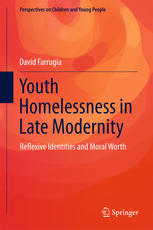

Most ebook files are in PDF format, so you can easily read them using various software such as Foxit Reader or directly on the Google Chrome browser.
Some ebook files are released by publishers in other formats such as .awz, .mobi, .epub, .fb2, etc. You may need to install specific software to read these formats on mobile/PC, such as Calibre.
Please read the tutorial at this link. https://ebooknice.com/page/post?id=faq
We offer FREE conversion to the popular formats you request; however, this may take some time. Therefore, right after payment, please email us, and we will try to provide the service as quickly as possible.
For some exceptional file formats or broken links (if any), please refrain from opening any disputes. Instead, email us first, and we will try to assist within a maximum of 6 hours.
EbookNice Team

Status:
Available0.0
0 reviewsThis book explores the identities, embodied experiences, and personal relationships of young people experiencing homelessness, and analyses these in relation to the material and symbolic position that youth homelessness occupies in modern societies. Drawing on empirical research conducted in both urban and rural areas, the book situates young people’s experiences of homelessness within a theoretical framework that connects embodied identities and relationships with processes of social change. The book theorises a ‘symbolic economy of youth homelessness’ that encompasses the subjective, aesthetic, and relational dimensions of homelessness. This theory shows the personal, interpersonal and affective suffering that is caused by the relations of power and privilege that produce contemporary youth homelessness. The book is unique in the way in which it places youth homelessness within the wider contexts of inequality, and social change. Whilst contemporary discussions of youth homelessness understand the topic as a discrete ‘social problem’, this book demonstrates the position that youth homelessness occupies within wider social processes, inequalities, and theoretical debates, addressing theories of social change in late modernity and their relationship to the cultural construction of youth. These theoretical debates are made concrete by means of an exploration of an important form of contemporary inequality: youth homelessness.